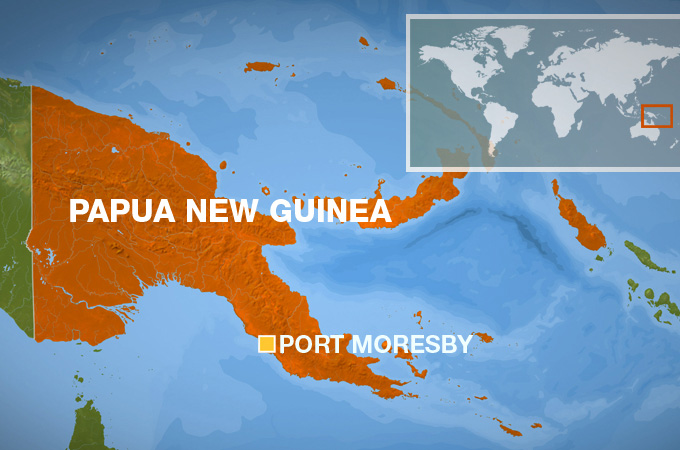Troop mutiny sparks Papua New Guinea crisis
Government orders soldiers who seized army HQ and replaced the defence chief to surrender or “face the consequences”.

An army faction backing Papua New Guinea’s former prime minister, Michael Somare, has staged an apparently bloodless mutiny and installed a new military leader in the South Pacific island nation.
A deadline given by the government of the incumbent prime minister, Peter O’Neill, to the mutineers to surrender or “face the consequences” expired at 4pm (06:00 GMT) on Thursday.
“They say this mutiny amounts to treason, and that the death penalty will follow if the soldiers don’t give themselves up,” Al Jazeera’s Andrew Thomas, following developments from neighbouring Australia, said.
The mutineers raided army headquarters in the capital, Port Moresby, in the early hours of Thursday. They placed Brigadier-General Francis Agwi, the head of the army, under house arrest and installed retired Colonel Yaurra Sasa as their leader.
The Australian foreign minister said in a statement that Agwi had been released later in the day.
Sasa insists he is not mounting a coup. But he says that the military will take unspecified action unless O’Neill resigns and Somare is reinstated, as ordered by the national supreme court last month.
“Both Sir Michael Somare and O’Neill have seven days to implement the supreme court’s orders to resolve the current political impasse or I will be forced to take actions to uphold the integrity of the constitution,” Sasa said.
O’Neill’s deputy said 30 soldiers had been involved in the mutiny and that 15 of them had been arrested.
Residents in Port Moresby said the capital was quiet, but tense, with roadblocks around the main army barracks.
Power struggle
The developments follow weeks of political instability, with Somare challenging the legitimacy of O’Neill’s government.
Somare was replaced by O’Neill in August after his seat was declared vacant while he received medical treatment in Singapore.
 |
But in December, the constitutional court ordered Somare be reinstated, saying the proper procedures to replace had not been followed.
O’Neill dismissed that decision, and then passed retrospective laws legitimising his transition to power.
“He has control of most of the civil services, the majority in parliament, the police, and until these last few hours, it was thought, of pretty much the whole army too”, our correspondent said.
Elections are due in June.
For many Papua New Guineans, the crisis is a contest between the old political guard of Somare – known as “the chief” who led the country to independence – and O’Neill’s administration, which is seen offering a fresh, more open alternative.
Call for restraint
Somare said that the mutiny leader had been appointed to “take control” of the armed forces.
“It is incumbent on the police and army to comply with the orders of the supreme court and support the legitimate government,” he said in a statement distributed by his daughter.
“It is for this reason that my government had appointed Colonel Yaurra Sasa to take control of the [army] while we await other outcomes of the court.
|
“Unless both sides step back from current position there is very good chance it will lead to conflict in the near future“ – Damien Kingsbury |
“I call on the disciplinary forces to ensure public safety by exercising utmost restraint at all times. We are the legitimate government.”
Local reporters said it was unclear how much support the rebels had inside the military, believing they may be only a small band, with most soldiers either backing O’Neill or dissatisfied with both O’Neill and Somare.
Damien Kingsbury, professor of international relations at Deakin University in Australia, said the mutiny was “likely a counter-coup”.
“There is tense and uncertain situation,” he told Al Jazeera.
“There is no external mediation, no neutral party at the moment, and unless both sides step back from current position there is very good chance it will lead to conflict in the near future.”
Australia called for a restoration in the line of command in Papua New Guinea’s defence forces.
“We urge that the situation be resolved as soon as possible, and that the Papua New Guinea Defence Force chain of command is restored,” the Australian foreign ministry said in a statement.
Somare held office from 2002 to 2011. He had previously served as Papua New Guinea’s first prime minister when it became independent in 1975.
Papua New Guinea has a history of political and military unrest. An army mutiny in 1997 overthrew the government after it employed mercenaries to try and end a long-running secessionist rebellion on the island of Bougainville.